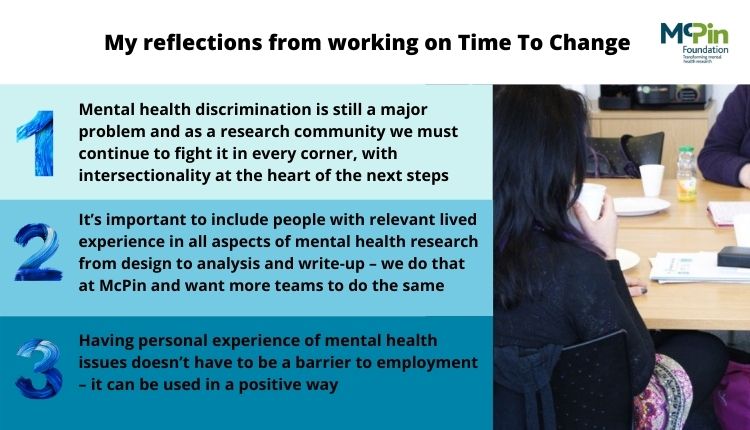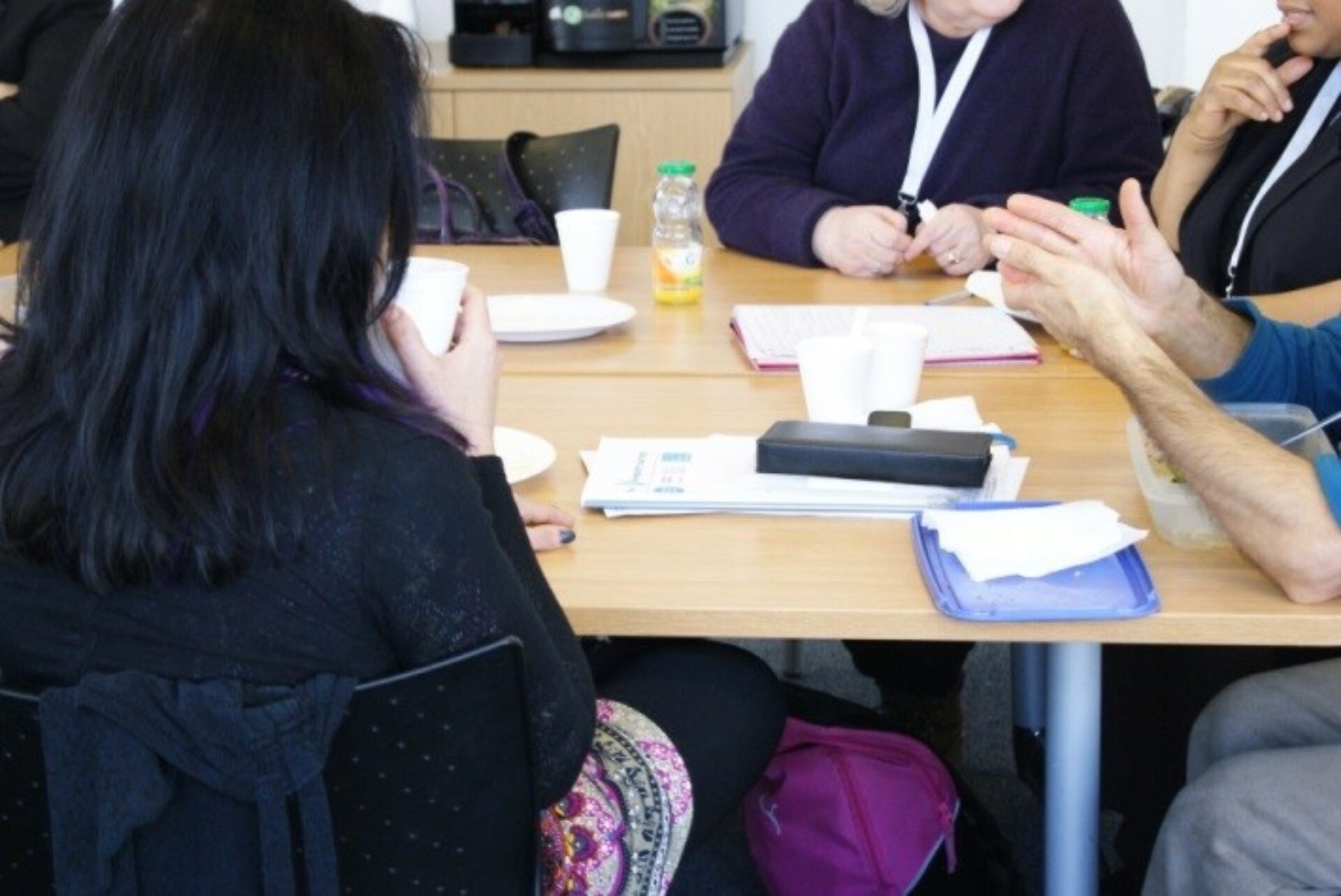McPin researcher Lisa reflects on the incredible impact Time to Change has had, both on her personally and on the wider mental health landscape – and what needs to happen next.
At the end of March funding for the Time to Change (TTC) programme ended, and it came to a close after 15 years.
I have followed TTC, a campaign which was set up to end mental health stigma and discrimination, for a long time. I was also involved, in a small way, with its evaluation.
I thought, therefore, that this would be a good time to reflect on what it’s meant to me on a personal level, and also think about the wider impact it’s had on society’s attitudes towards mental health stigma and discrimination.
From service user to researcher
Thinking about the beginnings of Time to Change, and how I learned about it, takes me back nearly 14 years.
I was at a mental health support group and noticed a flyer advertising for service users to become involved with a study called the Viewpoint Survey.
It offered the opportunity to work from home interviewing people, paid well, and all it asked for was lived experience of mental health difficulties (‘all it asked for’ – how ridiculous that sounds to me now; lived experience is nearly everything!).
The Viewpoint Survey was set up by Kings College London to address changing attitudes and resources around mental health and help evaluate the impact TTC was having.
It ran between 2008 and 2014 and involved interviewing roughly 1000 participants per year. McPin co-founder Vanessa was one of the project leads and helped to secure around £20,000,000 in funds.
I’ve been a service user on and off since I was 15 and have experienced a lot of discrimination and stigma in the intervening 34 years. I didn’t have the first clue about research in general, never mind mental health research – like many others, I thought of it as something done in a lab – I just knew this seemed important.
Here was this opportunity that not only wouldn’t penalise me for my mental health difficulties but would help me reframe and actually use them in a positive way.
‘I felt my mental health difficulties meant I would never be able to work again’
There were roughly 22 of us at the first meeting, all from different walks of life and all with different reasons for being there, yet most of us were united by our shared experiences of mental health difficulties.
It was so exciting. I had been at home raising my boys for many years and was terrified by the very notion of going back into the working world.
I had felt my mental health difficulties would mean I would never really be able to work again – at least not in any environment that would give me any satisfaction. And yet here was this opportunity that not only wouldn’t penalise me for my mental health difficulties but would help me reframe and actually use them in a positive way to enhance the evaluation.
I was lucky enough to be in the team involved in the designing the study and analysing the data, as well as conducting the interviews, with nearly all of us employed for our lived experience of mental health difficulties.
I think it was important that, very early on, the decision was made to employ a team of service users to conduct most of the interviews. This wealth of lived experience cannot have failed to positively impact the quality of the responses, as well as how we analysed the data and wrote up the findings.
I can honestly say that becoming involved with the survey quite profoundly changed my life. I had truly written myself off but I’m still here and I’m still working.
No need to hide or pretend
This world of work was entirely new to me – true appreciation, no need to hide or pretend anymore and no more elephants in the room. For the first time for many of us we had the freedom to exchange our views and stories about mental health without fear of discrimination.
I can honestly say that becoming involved with the survey quite profoundly changed my life. I had truly written myself off but I’m still here and I’m still working, so Time to Change really did change all of that – for me, at the very least.
Meeting objectives personally and professionally
Throughout the process, the TTC objectives have also come to represent some fundamental changes within my own life. For example, with the objective of “Improving public attitudes and behaviour towards people with mental health problems”; I no longer feel I have to pretend to be okay as often, which has always been so exhausting and certainly impacted my own mental health. People seem less judgmental and more able to accept the reality of my difficulties.
However, others have been a little more difficult on a personal level – such as “Reducing the discrimination that people with mental health problems report in their personal relationships, social lives and at work”. The stain from years of external stigma is not going to go away quickly and I believe there is still some way to go, but I’m also more aware of my own self-stigma.
Have attitudes toward mental health changed?
On a wider level I have noticed conversations about mental health springing up everywhere. I find people talk about it almost as much as they talk about the weather – and often in conjunction with talking about the weather (“Oh, this constant rain is getting me down”)! People may not always agree but they are talking, and this is changing attitudes.
The media also talks about mental health on a regular basis and it’s heartening to see a variety of celebrities talking about their own mental health battles. If it can happen to them it can happen to anyone and that message has finally touched most people.
Are changing attitudes enough?
There has been progress across all areas of society, and we have Time to Change to thank for much of that, but is it enough? As with any work in progress, for two steps forward there can be one step back.
The world is a very different place to what it was when Time to Change was getting off the ground. There’s a common statistic that 1 in 4 people will experience a mental health problem at some point in their lives and I wonder, given coronavirus, what those statistics look like now.
So, is it time to stop? I really don’t think so – this is only just beginning. There is still so much we can learn from Time to Change, which proved that, given a concerted effort and enough money, change really is possible.
Maybe we can think about the sorts of things that have instigated change and learn from them, so we can apply them to the myriad types of discrimination that continue to persist today.

Lisa Couperthwaite is a remote peer researcher at the McPin Foundation. She has worked on a number of projects over the years including The Viewpoint Survey, TOG and, more recently, Work Well.
Read our first Time to Change blog from McPin Head of Research Vanessa Pinfold to find out how McPin has supported the anti-stigma campaign and also been shaped by it.
